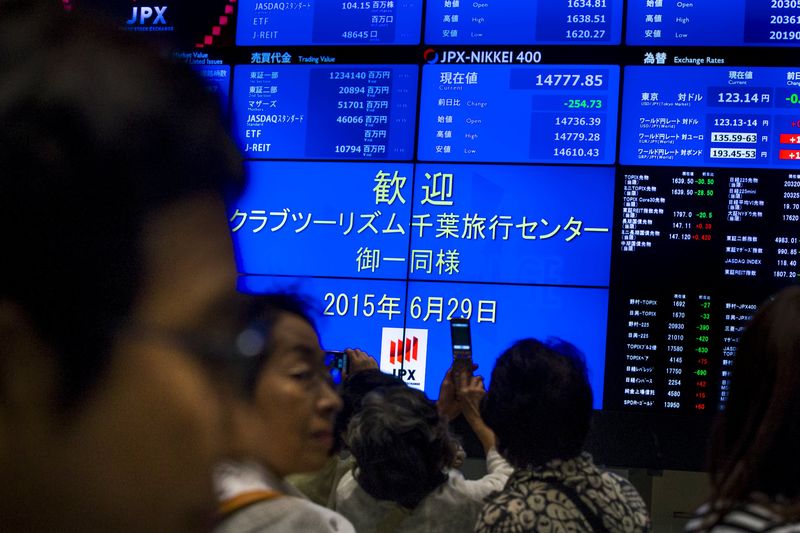(Repeats story first published on Wednesday, no change to text)
* Foreigners sold Y2.1 trln Japan shares in last 6 wks
* Strong Apr-June earnings, GDP fail to buoy Japan shares
* Investors wary yen could hit highs in Sept
* Midyear results in Oct-Nov may give market fresh fillip
By Tomo Uetake
TOKYO, Sept 6 (Reuters) - Foreign investors are ditching Japanese stocks, as worries about a rising yen eclipse the brightest earnings season in years, an economy brimming with vigour and business confidence at its highest since before the global financial crisis.
Tensions on the Korean peninsula and lingering concerns about U.S. President Donald Trump's economic policies are playing spoil sport, pushing the yen closer to its strongest level in 10 months against the dollar in a discouraging sign for Japanese exporters' profit outlook.
The benchmark Nikkei average .N225 has duly slumped, hitting 4-month lows on Wednesday, as foreigners have dumped Japanese shares over the past six weeks despite relatively cheap valuations versus other major markets.
In the past five years, Japanese shares have been more expensive than Europe but they are now traded at 14.4 times forecast earnings over the next 12 months, almost on par with Europe, and much cheaper than the U.S., Canada, Australia and India, based on data from Thomson Reuters.
Yet foreign investors, who appear to have priced in the recent positive earnings and economic news, worry that a rising yen could spell trouble for export-reliant Japan.
"Renewed yen appreciation could result in revisions to earnings forecasts of export-oriented companies," said Sean Taylor, chief investment officer for the Asia Pacific at Deutsche Asset Management.
"The geopolitical risk radiating from the tensions between North Korea and the U.S. could limit the short-term upside in the equity market."
Foreigners have sold a net 2.1 trillion yen ($19.4 billion) worth of Japanese equities, both cash and futures, for six weeks in a row since mid-July, according to data from the Japan Exchange Group.
It was the biggest selling spree since between December 2015 and March 2016, when they sold 6.3 trillion yen worth of stocks.
YEN FOR STABILITY
The yen tends to gain during times of economic and political uncertainty, because traders assume Japanese investors' repatriation will outweigh selling of domestic assets by foreign investors given Japan's huge net international assets.
And there is plenty of uncertainty to go around these days, starting with North Korea's belligerent pursuit of nuclear weapons.
Pyongyang's biggest ever nuclear test over the weekend has further ramped up tensions with the United States. Investors also worry a sharply divided U.S. political landscape could scupper Trump's economic agenda and force a government shutdown before an agreement on the U.S. debt ceiling can be reached by the end-September deadline.
The yen stood at 108.60 per dollar JPY= , up 7.7 percent for the year, and analysts say a rise above the April peak of 108.13 yen could force many companies to downgrade their profit outlook. Watanabe, quants analyst at Mitsubishi UFJ Morgan Stanley (NYSE:MS), estimates a rise of one yen in the dollar/yen would reduce the overall operating profits of corporate Japan by 0.5 percent.
That is a major reason for investors to quickly move past the April-June quarter reporting season where net profit at 1,017 top Japanese firms hit 7.9 trillion yen, making it the best first quarter in 11 years, according to Watanabe.
In the same quarter Japan's economy grew at its fastest pace in more than two years, while business confidence in August was at its highest in a decade. the Nikkei fell to a four-month low on Wednesday and its 1 percent gain so far this year pales in comparison with a rise of 6 percent in Germany's DAX .GDAXI , 10 percent in S&P500 .SPX and 26 percent in Hong Kong's Hang Seng .HSI .
'DEATH CROSS'
Fund managers say the July-Sept quarter earnings season starting mid-October, when firms are typically more likely to announce their forecasts, could sway the market's outlook for the rest of the year.
In the meantime, technical indicators are also flashing bearish signals.
The Nikkei formed a "death cross", where the 25-day moving average line falls below the 75-day average line, seen as a major bear signal.
A closer look at data suggests the selloff has been led by players focused on the short-term. Of foreigners' total net selling value of 2.1 trillion yen, selling in the Nikkei futures JNIc1 JNMc1 , a favourite tool of short-term players, accounted for an unusually hefty 49 percent.
"If the yen strengthens further, long-term foreign investors would sell Japan on a full scale and the stocks would take a bigger hit," said Takehiro Okada, head of trading at Rheos Capital Works.
($1 = 108.60 yen)
<^^^^^^^^^^^^^^^^^^^^^^^^^^^^^^^^^^^^^^^^^^^^^^^^^^^^^^^^^^^ Nikkei and dollar/yen
http://reut.rs/2wrdDhJ Foreign investors in Japanese share markets
http://reut.rs/2wrmlfC Death cross on Nikkei
http://reut.rs/2wFIV4f
^^^^^^^^^^^^^^^^^^^^^^^^^^^^^^^^^^^^^^^^^^^^^^^^^^^^^^^^^^^>
